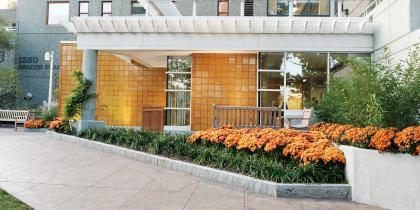Intergenerational Living at Center Communities of Brookline (and at 23)
What does it mean to live in a senior living community as a young adult?

I’m 23. I just graduated from college. And in addition to working as a program coordinator on Hebrew SeniorLife’s Volunteer, Youth, and Community Engagement team, I’m piloting intergenerational living at Center Communities of Brookline, an independent senior living apartment community near Coolidge Corner.
And so it happened that when Russia invaded Ukraine, I found myself viewing the attack from the vantage of a very unique community — one with many Russian-speaking members and some who have a personal relationship to Eastern Europe defined by exodus and trauma. So it struck me that many of my neighbors did not want to experience the tragedy (with all its welling up of memory and fear) from the privacy of their apartments — they wanted outlets to discuss, mourn, and even learn together. Rabbi Jim Morgan, the community’s chaplain, quickly turned his weekly Monday afternoon “Soul Search” program into a bilingual “Peace Vigil.” That following Sunday, I got an email from Laura*, a fellow resident: She wanted to screen Winter on Fire, a documentary about the 2013 and 2014 Maidan protests in Kiev, and host a discussion afterward. She asked for my help setting it up.
Just before 7 p.m. Monday evening, I headed downstairs from my fifth-floor apartment. A large, bilingual crowd had assembled in the community room. I plugged in my laptop, set up the microphone, and yielded the floor to Laura to introduce the film. It was a team effort: Laura, long-time resident; Gale, the resident services coordinator; and me. Since then, we’ve made evening documentaries a weekly event.
A Little about Me
I’m a good test case for multigen living. I spent my college years studying elder care, policy, and society. A year ago, I worked as a home health aide for Hebrew SeniorLife Home Health (fieldwork for my thesis in social anthropology). And I’ve thought deeply about what it means to experience late adolescence in proximity to elderhood. When I was looking for an opportunity after college, a community leader at Hebrew SeniorLife pitched the idea to me: “Come live here,” she said, with a sort of optimism and creativity I’ve found again and again at the organization. “We’ve always wanted to try it.”
Five months in and I really feel — as I did that Monday evening — that my presence at Center Communities of Brookline matters. I help facilitate community life at off-hours for most staff. I bring different perspectives to community discussions and a youthful sensibility to community life – not to mention, when I can, a whole new crowd of young folks. And I try to do it in a way that feels organic (sometimes barefoot, always with a sense of humor): After all, I’m just another resident here.
Some Background
Of course, multigenerational living did not begin with me at Center Communities of Brookline. In fact, there are more multigenerational households today than at any time since the 1950s. Still, in a moment when social isolation and loneliness have damaged the fabric of older and younger adult life — increasing morbidity and mortality for both groups — bringing those groups together offers a great opportunity to create intentional spaces of mutual care and regard.
Those familiar with Hebrew SeniorLife will quickly think of our NewBridge on the Charles Community in Dedham, which shares a campus with the Rashi School, a K-8 Jewish day school— a setup which lends itself to frequent and innovative intergenerational engagement. The enmeshment of schools and housing for older adults has indeed become increasingly common across the country from retirement communities on college campuses, to college students living in independent living. But the modalities of multigenerational living go beyond that: from agriculturally-based “regenerative communities” to venture capital-backed home-sharing platforms.
The Meaning of Independence
Crucially, intergenerational has never been one-directional for me. Like many of my neighbors, I’m in a transitional stage of my life, figuring out what it means to be an adult (no longer a college kid) with a job and a fridge and utilities. It’s, of course, a very different transition, but I’ve come to realize it shares many of the same challenges. For example, advocates for older adults know loneliness and social isolation can be detrimental to health and wellness as we age. While I’ve been here, Center Communities of Brookline has addressed loneliness and social isolation extensively both in its care and its community discussions. Less discussed, perhaps, is that my age group is equally and, in fact, by the numbers, perhaps more, impacted by these issues.
So at a moment when my primary community of four years (college) fast recedes — my friendships pared down to the closest, many made tenuous by distance — this community sustains me. Likewise, in a year of mundane firsts — rent and utility bills, health insurance, full-time job — this community makes me feel a little less on my own. My neighbors can and do lift me up and care for me. It matters that I have a movie to screen, a neighbor to wave to, a resident services coordinator to text with occasionally. I feel this community will make the transition to “full” adulthood and my own negotiations with independence easier.
I turned 23 on April 10. The Sunday prior, I was sitting in the community room, doing computer work, alongside some residents who were working on independent art projects. Just then, one of our neighbors burst in: “Everyone, stop what you’re doing! It’s Isaac’s birthday!” She had jumped the gun by a week, but the song and the piece of tiramisu and most of all, the thought turned a regular Sunday afternoon into a memory I’ll cherish forever.
That’s the scrappy warmth, the humanness I love about this experience. It’s also what makes independent living work. As hard as it can be to grow up and grow old, it’s made easier — even beautiful — by doing it in the company of others. I’m so frequently moved by the sense of humor, compassion, and openness of my neighbors, not merely as a collection of individuals but as a collective and how quickly and completely I was included in that ethos.
What My Friends Think
Each week, I hold a Saturday evening discussion group. We mostly talk about art — reading through one of the New York Times’s Close Read pieces. For a little context, Close Reads are interactive, multimedia “essays” about art. Each one analyzes a specific painting (or, less often, a poem) to unlock its secrets: what it says, how it says it, and with what and whom it’s in dialogue. They’ve really spawned a small community of fans in the Goldman Family Residences where I live; sometimes up to 20 people will join me for an interactive reading in the community room. It’s amazing the level of art criticism we can achieve together, and the way we can pull in the wider web and our collective knowledge to more deeply engage with the artwork and the essays themselves.
On occasion, I’ve brought along a friend my age — just to give them a sense of how amazing the community is here, how lucky I am to be part of it. I recently asked my friend Shaan what he thought about the experience, and he said:
“I was surprised by the readiness with which people made comments and the wit and liveliness of those comments. I’ve been trained to infantilize old people, to talk to them in a high pitched, slow, exaggerated voice. Time with them has always felt like service on my part, a ‘giving up’ of my time or value to make someone else feel better. This turned those ideas on their head. I was just another member of a group of people talking about art. It was fun, interesting, and entirely normal.”
There’s so much to unpack in Shaan’s comments, but the word normal in particular says a lot. So often my friends seem perplexed by my life at Center Communities of Brookline. Do I like it? Does it feel like I’m at work all the time? What, in Shaan’s words, am I “giving up”? I understand the questions, but they’re not true to my experience. I love living in this community, and so much of it feels intensely normal in the grounding, sociable, caring way I want, and maybe need. Intergenerational living works because you don’t have to be obsessed with elder care to live in a senior living community. “I was just another member of a group of people talking about art,” Shaan said. Yeah, exactly!
I don’t want to undersell what multigen living can be — the high degree of care and service younger people can provide in communities for older adults. It’s conceivable that younger residents could provide case management, home care, respite care, etc. Multigen life could be anything but normal. Still, Shaan’s realization excites me; it proves to me that multigen living really is achievable at scale, that young people can be convinced of its mutual value (beyond reduced rent), that my love for life here is by no means unusual. So when I say that I’m a good test case for multigen living, it’s true. But my mission here — among my neighbors, my colleagues, and my wider community — is to normalize my presence, to show how obvious it is, how right it feels.
Who knows? Maybe Shaan will be next.
*names have been changed to protect residents’ privacy
Blog Topics
Learn More
Senior Living in Brookline
Center Communities of Brookline is an active apartment community for older adults, located near Coolidge Corner and Washington Square. The community includes options for seniors of all income levels, plus amenities like on-site dining and health care, lifelong learning opportunities, wellness programming, and supportive services.




